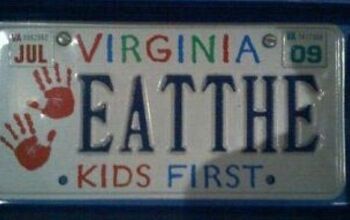FRESPCH and VNTY PL8S
Should states be allowed to sell specialty license plates with religious messages? Stefan Lonce, author of a book on vanity license plates, doesn't think so because he wants The New York Times to promote his book and we all know where they stand on the old church-state thing. The one-time New York Times op-ed contributor points out that federal courts consistently rule that vanity plates are protected under the First Amendment. Unless, that is, someone finds the plate offensive. Lonce advocates establishing a national database of "prohibited vanity plate messages, created with advice from First Amendment experts and open to public scrutiny." States would use the db to determine what's PC and what's not. Lonce doesn't even consider the fact that a plate that's considered "offensive" in one state would be perfectly acceptable in another. For example, religious messages prohibited by state law in Vermont are perfectly acceptable in most southern states. "As long as we have a reliable method for deciding what's allowed and what isn't," Lonce concludes. "I say the more, the merrier." And Lonce and his pals at The Grey Lady need to stop trying to say how the First Amendment should be interpreted for the rest of us.
More by Frank Williams


































Comments
Join the conversation
As long as it doesn't contain obvious profanity, I don't see what the big deal is. If it offends you, tough. I believe in limits to "free" speech, but I also believe in very limited limits. When I see something that offends me, whether it be a bumper sticker or a license plate, my first reaction is not "their should be a law against that"; it's "what a moron" or something similar. In other words, I think your freedom of speech extends to your right to say something that I think is stupid, and I expect you to afford me the same right.
I believe the rhetoric against exists only because the rhetoric for exists. There were many quaint and now outdated notions back in the 1700s: slavery, exorcism, the outing of witches, that sort of thing...